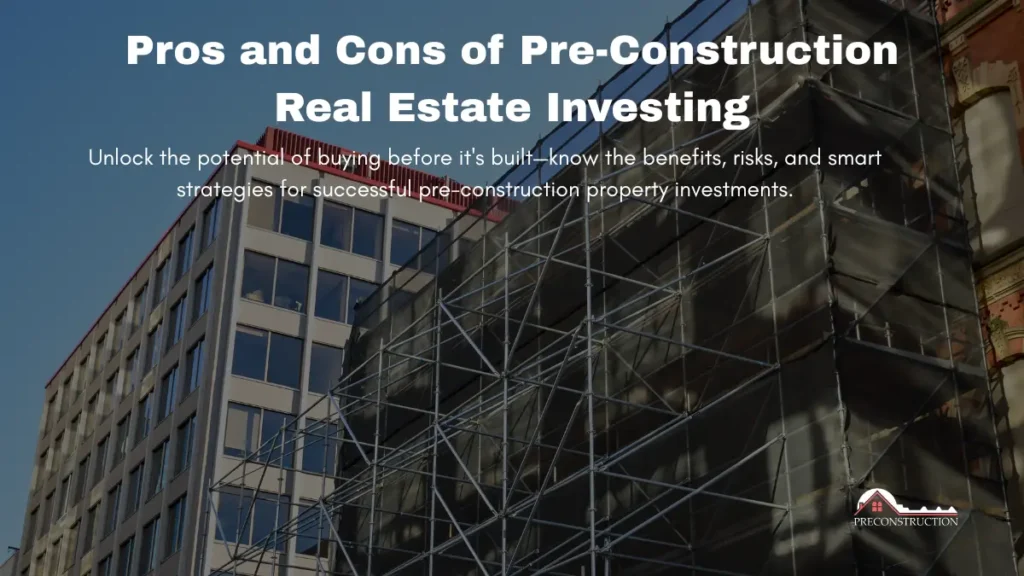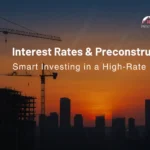Pre-Construction Real Estate Investing – Investing in real estate is often considered one of the most reliable ways to build long-term wealth. Among the many strategies available, purchasing pre-construction properties has become increasingly popular, especially in growing urban centers. The appeal of locking in a unit at today’s prices, customizing finishes, and leveraging flexible deposit structures is enticing for many investors seeking capital appreciation.
However, the journey of pre-construction investing isn’t without its pitfalls. Delays, financing uncertainties, market fluctuations, and hidden costs can all impact the profitability of your investment. In this blog, we will explore the advantages and risks associated with pre-construction real estate investments, giving you a well-rounded perspective to help you decide if this strategy aligns with your financial goals.
Add value and flexibility to your property with one of our approved custom garden suites in Toronto.
What is Pre-Construction Investing?
Pre-construction investing involves purchasing a property—typically a condominium or townhouse—before it has been built or completed. Investors buy units directly from developers during early sales phases, often relying on architectural renderings, floor plans, and marketing brochures to make their purchase decision.
While this approach offers access to new, modern properties at pre-market prices, it also requires a long-term commitment and a thorough understanding of the development cycle, contractual obligations, and market dynamics.
Discover urban living and suburban comfort in these curated Mississauga real estate listings.
Advantages of Investing in Pre-Construction Properties
1. Potential for Price Appreciation Before Completion
One of the most attractive features of pre-construction investment is the ability to secure a property at today’s price while benefiting from market appreciation during the construction phase. In fast-growing markets where housing demand outpaces supply, prices often rise steadily over the 2–5 year period it takes to complete a development.
For investors, this means the opportunity to realize gains even before taking possession. If the market appreciates as projected, you could assign (resell) your unit before closing or enjoy substantial equity gains upon occupancy.
Find family-friendly neighbourhoods with modern builds in our Markham real estate listings.
2. Flexible Deposit Structures Reduce Initial Capital Outlay
Unlike traditional real estate purchases that require the full down payment and mortgage financing upfront, pre-construction properties typically follow a staggered deposit schedule. Developers often ask for a 15% to 20% deposit spread over multiple installments, sometimes over 12–24 months.
This phased approach provides investors with breathing room to manage their cash flow. It allows for financial flexibility, freeing up capital to pursue other investment opportunities during the construction period.
Explore exciting new communities through the latest Vaughan real estate listings and project launches.
3. Access to Brand-New, High-Efficiency Units
Pre-construction buyers have the distinct advantage of owning a brand-new property. These units often come with state-of-the-art appliances, energy-efficient systems, modern design layouts, and contemporary amenities that older resale properties might lack.
Additionally, many developers offer customization options where buyers can select finishes, materials, fixtures, and sometimes modify floor plans. This level of control enables investors to tailor the unit to suit rental market demands or future resale preferences.
Browse top-rated Hamilton real estate listings with both resale and pre-construction options.
4. Strong Tenant Appeal and Premium Rental Rates
Modern buildings with cutting-edge amenities, energy efficiency, and smart home technology are highly attractive to renters. In urban markets with limited rental supply, new properties can command premium rents compared to older units.
Investors aiming to lease out their property post-completion often find that brand-new condos offer higher rent-to-price ratios, especially in neighborhoods with a younger, professional tenant demographic.
Read expert takes and investment strategies on the Wedu real estate blog updated regularly with GTA trends.
5. Builder Warranty Protection
Most pre-construction homes and condos are covered under new home warranty programs. These warranties typically cover workmanship defects, structural issues, and system failures for a specified period after occupancy. For investors, this reduces repair and maintenance expenses in the early years of ownership.
Access comprehensive Toronto MLS and real estate listings including condos, townhomes, and new builds.
Risks and Drawbacks of Pre-Construction Investing
1. Construction Delays and Uncertain Timelines
One of the most common risks in pre-construction investing is construction delays. Factors such as labor shortages, material cost escalations, permit approval delays, or unforeseen site challenges can push completion dates well beyond the initial projections.
For investors who have planned their financing or exit strategies around a specific occupancy date, delays can result in increased carrying costs, lost rental income, or missed resale opportunities.
Explore or compare MLS® listings in Greater Toronto Area for sale and rent on one of the most trusted platforms in Ontario.
2. Financing Risks at Closing
Securing a mortgage for a pre-construction property comes with unique challenges. Mortgage lenders typically do not offer firm approvals several years in advance. As a result, investors are required to qualify for financing near the completion date, often years after signing the purchase agreement.
If interest rates have risen, lending criteria have tightened, or your personal financial situation has changed, you may struggle to obtain favorable mortgage terms—or worse, fail to qualify altogether. Additionally, if property values decline before closing, lenders may appraise the unit below your purchase price, requiring you to cover the shortfall.
Stay informed on Canada’s real estate market through the latest updates on our Preconstruction Blog.
3. Limited Transparency and Developer Risk
When buying a pre-construction unit, you’re purchasing based on marketing materials rather than a finished product. While developers provide floor plans and 3D renderings, the actual build quality, materials used, and final finishes can sometimes fall short of expectations.
Secure a property in one of the most promising suburbs with our Richmond Hill pre-construction developments.
Developer credibility is crucial. Issues like downgraded finishes, modified layouts, or cancelled amenities are not uncommon. Conducting thorough due diligence on the builder’s track record and previous projects can help mitigate these risks.
4. Hidden Costs and Closing Adjustments
Investors often underestimate the additional costs associated with pre-construction properties. Beyond the purchase price, buyers are responsible for:
Development levies and charges
Land transfer taxes
HST (where applicable)
Interim occupancy fees (for condos)
Legal fees and disbursements
These closing costs can add up to several thousand dollars, impacting your projected returns.
Invest in high-demand Mississauga pre-construction condos with excellent transit and amenities.
5. Market Volatility and Economic Risks
Pre-construction investments are exposed to market risks over an extended period. Economic downturns, interest rate hikes, regulatory changes, or an oversupply of new units can all impact the property’s value and rental demand at the time of completion.
If the market experiences a downturn, investors may face challenges in renting or selling the property at their anticipated price point, potentially reducing returns or forcing a longer holding period.
Discover elegant Markham pre-construction homes in a vibrant and diverse community.
How to Mitigate Risks and Maximize Returns in Pre-Construction Investing
Despite the risks, pre-construction investments can be highly rewarding if approached strategically. Here are essential steps investors should take to safeguard their investment:
1. Vet the Developer Thoroughly
Research the builder’s past projects, completion timelines, and reputation in the market. Look for developers with a history of delivering high-quality buildings on time. Attend launch events, visit previous developments, and consult with industry professionals familiar with the builder.
Check out the latest pre-construction homes in Hamilton with strong growth and rental potential.
2. Understand the Purchase Agreement
Pre-construction contracts can be complex. Engage a real estate lawyer experienced in new construction agreements to review assignment clauses, cancellation rights, construction timelines, and closing costs. Ensure you’re clear on your obligations and rights as a buyer.
3. Stress-Test Your Financing
Plan for higher interest rates and stricter mortgage qualification rules by the time your property is ready. Consider getting pre-approvals and maintaining a financial cushion to cover any appraisal shortfalls or increased financing costs.
Explore stunning new Etobicoke pre-construction condos perfect for first-time buyers and investors.
4. Calculate Total Acquisition Costs
Factor in all closing costs, levies, taxes, and potential carrying expenses during interim occupancy. Ensure that your investment calculations include these hidden costs to avoid surprises at closing.
5. Stay Informed About Market Trends
Monitor local market conditions, supply pipelines, and economic indicators that may impact property values and rental demand by the time your unit is complete. Align your exit strategy accordingly, whether it’s renting, assigning, or holding long-term.
Discover top Toronto pre-construction condos for investment and end-user opportunities across the GTA.
Who Should Invest in Pre-Construction Properties?
Pre-construction investing is best suited for:
Long-term investors with a 5-10 year investment horizon.
Individuals with strong financial buffers who can handle potential closing cost surprises.
Investors who are comfortable with a degree of market risk and construction uncertainty.
Buyers looking for modern, customizable properties in high-growth urban markets.
Those seeking to leverage flexible payment schedules to build equity gradually.
Browse exclusive listings of pre-construction condos in Toronto and get early access to major developments.
Final Thoughts: Is Pre-Construction Investing Right for You?
Pre-construction real estate investment offers a unique path to property ownership with several distinct advantages, including capital appreciation, lower upfront capital requirements, and access to modern, high-demand units. However, it is not without its complexities.
Delays, financing risks, hidden costs, and market volatility require investors to approach these projects with thorough due diligence and a well-planned financial strategy. Success in pre-construction investing hinges on knowledge—of the developer, of market conditions, of financing realities, and of your own risk tolerance.
With the right preparation and expert guidance, pre-construction investments can be a powerful addition to a diversified real estate portfolio. However, investors must approach these opportunities with realistic expectations, an understanding of potential hurdles, and a strategy that prioritizes informed, data-driven decision-making.






